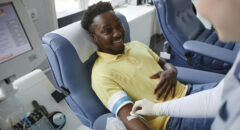
To treat prostate cancer, doctors perform tens of thousands of surgeries each year. In recent years, one procedure -- called a radical prostatectomy -- has become a fine art, says J. Brantley Thrasher, MD, a professor of urologic surgery at the University of Kansas Medical Center in Kansas City. While side effects like incontinence and impotence are still major concerns, most patients respond well to the surgery, Thrasher says.
In fact, many men respond almost too well. "They feel so good after the surgery that they start to push themselves too hard," he says. One of his recent patients went on a two-mile jog -- while still wearing a catheter. "I told him he needed to slow down and rest for a while."
If you have a radical prostatectomy in your future, you'll want to know what to expect. Here's a closer look at this procedure. As you'll see, your life won't necessarily take a turn for the worse after prostate surgery. In fact, it just might get better.
What will happen during recovery in the hospital?
According to Dr. Thrasher, the average hospital stay is brief and uneventful. When you wake from the anesthesia, you'll understandably feel a little sore. You'll have a catheter in your penis that will carry urine to a bag.
The catheter needs to be in place until your urethra heals, usually about two or three weeks. Within a few hours of the surgery, most patients are able to move around and eat a normal dinner. You can probably go home in two or three days.
What can I expect when I get home?
Once you get home, you'll have to take good care of your catheter. Examine it regularly to make sure it's securely in place. The University of Pittsburgh Cancer Institute recommends cleaning the opening of the penis with a 50/50 solution of water and hydrogen peroxide or an antibiotic ointment provided by your doctor. At home, the catheter should drain into a large bag. When you want to go out, you can wear a smaller bag under your pants leg.
Talk to your doctor about pain management. Many patients can get by with over-the-counter medications like ibuprofen, but some need stronger prescription medications, especially in the days immediately following surgery.
You may feel surprisingly good after the surgery, but don't go overboard. "Too many patients want to prove their manliness," Thrasher says. "They need to rest and give their wounds a chance to heal." He tells patients not to lift anything heavier than 10 to 15 pounds for at least six weeks. Many patients can quickly return to work, as long as it's not too strenuous, he says.
RELATED: Coping With Prostate Surgery Side Effects
What are the possible long-term side effects of a radical prostatectomy?
Men recovering from a radical prostatectomy often face two potentially life-changing complications: Incontinence and erectile dysfunction. In the past, these side effects were devastating and practically inevitable. More than half of the men surveyed in a recent study also reported some difficulties in these two areas. But thanks to nerve-sparing surgery and other improvements in surgical techniques, these side effects now tend to be less serious, and some men don't experience them, Thrasher says. "The complications of all types of prostate cancer treatments have continued to decline since the 1990s," he says. "We're getting better at what we do."
For many patients, urinary or sexual problems are only temporary obstacles, Thrasher says. "Patients will come to me and say that they dribble a little urine when they lift their golf bag over their heads," he says. They quickly learn to how to clench the muscles around the bladder to avoid such accidents.
Men who have trouble achieving erections can often return to normal -- or near-normal -- with the help of sildenafil (Viagra) or other treatments for sexual dysfunction, he says. Younger patients (age 65 and under) are especially likely to respond to such treatments.
RELATED: Try These Tips for a Successful Prostate Cancer Diet
Keep in mind, however, that your sexual machinery has changed. You can still have orgasms, but they will be dry. Without a prostate or seminal vesicles, your body will no longer be able to produce semen, so you won't be able to father a child. If you see children in your future, ask your doctor to collect sperm samples before the operation.
Despite these setbacks, however, most patients had an upbeat attitude. On the whole, any complications tend to be overshadowed by the relief of being cancer-free, Thrasher says. More than 90 percent of patients said their overall quality of life was back to normal within six to nine months of the surgery. Younger men proved to be especially likely to rebound quickly from the operation.
All in all, most men who opt for a radical prostatectomy are happy with their decision, Thrasher says. Surgery is hard on the body, but it's nothing compared to cancer.









